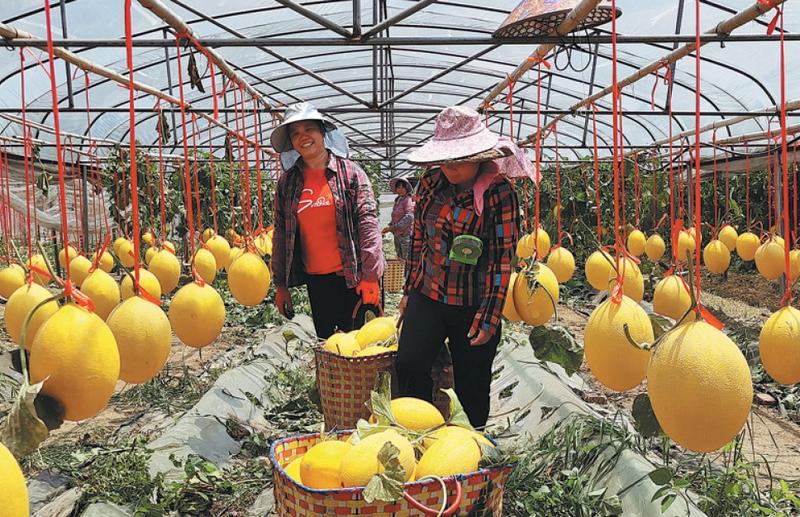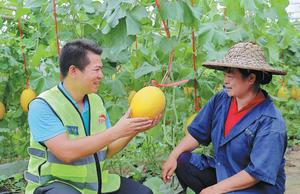Cantaloupe cultivation is the key to Helyu village's transition from poverty to prosperity, Wang Kaihao and Shi Ruipeng report in Laibin, Guangxi Zhuang autonomous region.
 Residents of the Zhuang ethnic group in Helyu village in Laibin, Guangxi Zhuang autonomous region, sing and dance to celebrate their harvest. (WANG KAIHAO / CHINA DAILY)
Residents of the Zhuang ethnic group in Helyu village in Laibin, Guangxi Zhuang autonomous region, sing and dance to celebrate their harvest. (WANG KAIHAO / CHINA DAILY)
For such a long time, the only interesting thing about Helyu village in Wuxuan county, Laibin, Guangxi Zhuang autonomous region, was that it sits on the Tropic of Cancer.
Other than that, it was difficult to discern any mentionable geographic feature. Without fertile land to produce lucrative crops or support an established industry, the village would hardly attract the attention of outsiders. Even for locals, it was a place they wanted to escape.
People now have more ways to earn money. By working hard on the farm, a better life can be achieved
He Kaifan, rural resident, Helyu village, Wuxuan county, Laibin, Guangxi Zhuang autonomous region
Bitterly, the village, where most residents are of the Zhuang ethnic group, was once nicknamed "an empty shell" by its inhabitants, not least because many residents left to work in factories in big towns, particularly in the more developed areas of Guangdong province.
When, in 2015, newly married Li Yongkai was assigned to the village to take charge of poverty alleviation efforts, he was stunned. About 18 percent of some 6,000 residents lived under the poverty line, which was defined in Guangxi at the time as drawing an annual income of 3,100 yuan (US$445) or less.
"The number of collectively-owned businesses in the village was zero," Li, 36, recalls. "People were poorly organized, and there was no pillar industry."
The major crop was cassava, but the most that each hectare of cassava could earn was 30,000 yuan a year. Some villagers tried to grow cantaloupe, but despite the abundant sunshine, their crops failed due to the area's barren soil.
Nevertheless, one thing was certain-villagers were eager for a better life.
"We had to make full use of the environment here," Li says. "Once an industry was established, it was not even a question of if we could get rid of poverty, it was more a question of when."
 Cantaloupe-growing has become a way toward prosperity for locals in Helyu. (WANG KAIHAO / CHINA DAILY)
Cantaloupe-growing has become a way toward prosperity for locals in Helyu. (WANG KAIHAO / CHINA DAILY)
To change the fate of the impoverished village, Li contacted technicians from other cities and helped introduce agricultural technology and new business models in Helyu. A soilless culturing technique using fermented pig manure and plant residue, like sugar cane and cassava, enabled cantaloupe to be grown and harvested twice a year, first during June and July, and then again between September and October.
Collectively owned farms were established in 2016, but such a change was not that easy to achieve in the beginning. While villagers were keen to become the shareholders of the new enterprise, many were reluctant to invest in the business of growing a fruit which they had never succeeded in cultivating in the past.
Barely more than one hectare of cantaloupe was grown that year. Wei Hengjiao was one of the first villagers to join.
Wei began to work in construction after graduating from junior high school and plied his trade on building sites in Guangxi, as well as nearby Guizhou and Guangdong provinces. Though his life was not easy, all those years of working in big cities had widened his horizons.
"Once I heard the cooperative was growing cantaloupes, I realized it was a great opportunity," he recalls.
The man applied for a 30,000 yuan loan and bought shares in the cantaloupe cooperative. He got a 5,800 yuan bonus at the end of that first year. Encouraged by his example, others began to follow, even those who were initially reluctant. More than 100 villagers invested in the cooperative and a larger plot of land was required to grow the fruit.
Now, there are four cooperatives growing cantaloupes.
To rent each hectare of land, the cooperatives pay the villagers an extra 15,000 yuan a year.
More than 300 greenhouses have been set up in Helyu village, covering about 23 hectares. Growing one hectare of cantaloupe can earn up to 540,000 yuan.
"The farms have offered 150 regular working positions for local villagers," Li says. "And because at least 200 people are required during the harvests, 50 temporary positions are available over those periods."
Three retail stores have opened in nearby towns to sell the village's products. Last year, sales of Helyu cantaloupes reached about 5 million yuan, and one-third of the melons were exported to Vietnam, according to Li.
"I have heard that there are cantaloupes produced elsewhere that get sold using our brand," Li says, with a wry smile. "I suppose that the counterfeits are proof of our popularity."
 Li Yongkai (left), head of a poverty alleviation team in the village, talks to a rural resident. (PHOTO PROVIDED TO CHINA DAILY)
Li Yongkai (left), head of a poverty alleviation team in the village, talks to a rural resident. (PHOTO PROVIDED TO CHINA DAILY)
To ensure quality, only one cantaloupe was grown on each vine, and skillful growers in the village are invited to join the cooperatives. As a leading grower of crops in the village, 44-year-old He Kaifan is now a manager of the farm.
"People now have more ways to earn money," He says. "By working hard on the farm, a better life can be achieved."
He's family earned 200,000 yuan in 2019, including salaries derived from one of the cantaloupe-growing cooperatives and the accompanying bonuses. The family enjoys additional income from growing mushrooms and raising pigs.
Inspired by the success of the cantaloupes, more varieties of fruits are grown by the cooperatives, including tangerines, plums and passion fruit. The rocketing pork price has also turned the village's 15,000 pigs into cash cows.
By 2019, the average annual per capita income in Helyu village had reached 8,740 yuan, and only eight people, or 0.13 percent of its population, were still classed as living under the poverty line, now defined as an annual income of 3,900 yuan.
"Each year, dozens of villagers choose to return and join our cooperative," Li says excitedly. "When more working opportunities are created here, people will be more willing to make contributions to their village."
But, the fruitful workers of the village are facing a new challenge.
Due to COVID-19, which caused some factories to put the brakes on their operations in the first half of the year, demand for the fruit fell. According to Li, last year, each kilogram of cantaloupes was worth up to 7 yuan wholesale, with a 30 percent retail markup. This year, however, they have not sold for more than 5 yuan per kilo.
Li and his colleagues soon responded by contacting more canteens of government and public institutions in a bid to safeguard the growth of the newly formed industry.
Sales of Helyu's cantaloupes reached about 2 million yuan in the first half of 2020.
"I believe the rebound of the economy in the second half of the year will keep our sales at the same level as last year," Li says confidently.
Li was supposed to stay in Helyu for a two-year term, but he has voluntarily extended his stay twice.
"There's a big picture to draw upon when rooted in the countryside and doing something beneficial for the villagers," he says. "As long as I feel I am needed, it's natural to continue my service here."
Rural tourism is the new path leading to prosperity. A new Tropic of Cancer theme park was set up in the village, enabling visitors to experience the leisurely picking of fruits and enjoying food closer to nature.
Still, Li keeps trying to think of new methods of promoting the cantaloupes to a wider market. A new retail store is planned to open soon in downtown Laibin, and the booming e-commerce industry has created new revenue stream for the villagers. However, the quality of their cantaloupe has brought a new threshold.
"You know, our cantaloupes are delicious because they are crunchy," he says. "The problem is, however, that they may be too crunchy to be shipped long distances by express couriers without splitting. To enlarge our market, that's the next puzzle we have to solve."
Contact the writers at wangkaihao@chinadaily.com.cn


